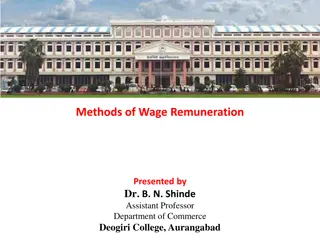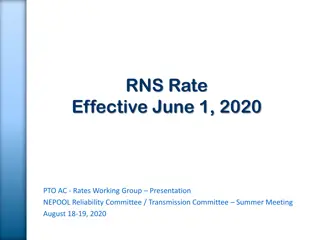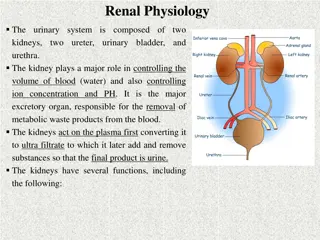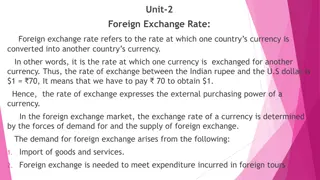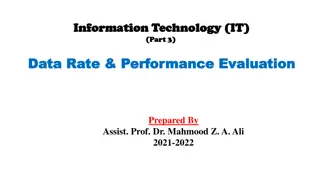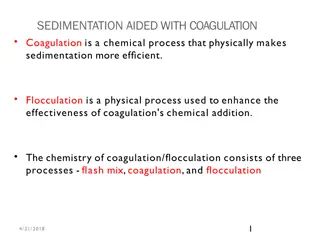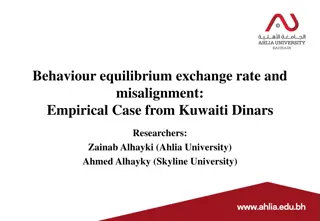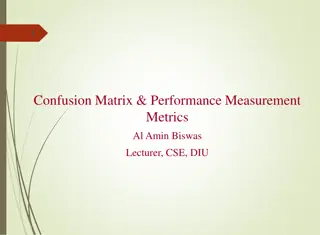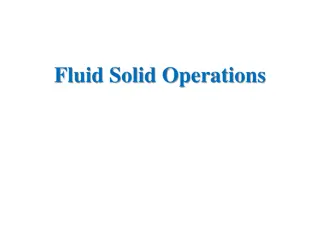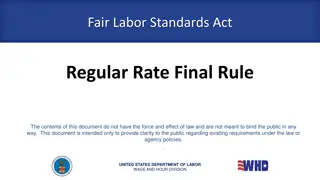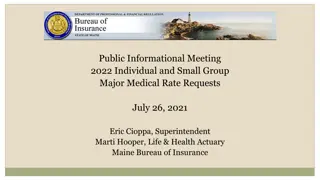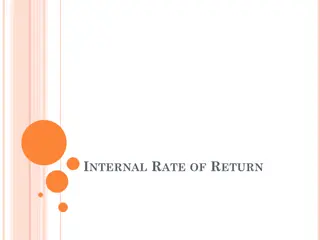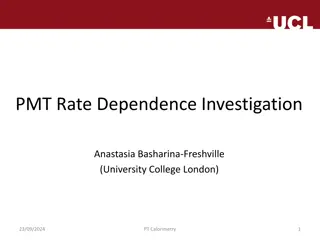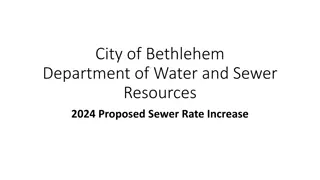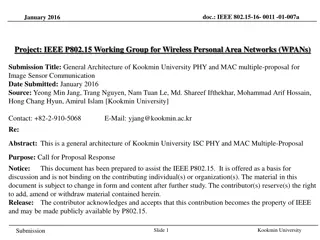Managing Interest Rate and Currency Risks: Strategies and Considerations
Interest rate and currency swaps are powerful tools for managing interest rate and foreign exchange risks. Firms face interest rate risk due to debt service obligations and holding interest-sensitive securities. Treasury management is key in balancing risk and return, with strategies based on expect
4 views • 21 slides
Improving Heat Rate Efficiency at Illinois Coal-Fired Power Plants
Heat rate improvements at coal-fired power plants in Illinois are crucial for enhancing energy conversion efficiency, reducing carbon intensity, and minimizing pollution. By increasing the heat rate/efficiency by 6%, these plants can generate more electricity while burning the same amount of coal. T
2 views • 11 slides
Wage Remuneration Methods Overview
Dr. B. N. Shinde, Assistant Professor at Deogiri College, Aurangabad, presents an insightful overview of methods of wage remuneration including Time Rate System, Piece Rate System, and Combination of Time and Piece Rate System. Time Rate System is the oldest method where workers are paid based on ti
0 views • 16 slides
Transmission Rate Change Overview for June 1, 2020
Presentation on the Rate Change effective June 1, 2020, detailing RNS Rate adjustments, Annual Transmission Revenue Requirements, and Regional Forecasts. The RNS Rate increased to $129.26/kW-year reflecting transmission project impacts, while ATRR analysis showed changes in revenue requirements for
0 views • 25 slides
Understanding Renal Physiology: The Role of the Kidneys in Maintaining Homeostasis
The urinary system consists of the kidneys, ureters, urinary bladder, and urethra, playing a crucial role in regulating blood volume, ion concentration, and pH. The kidneys, as the major excretory organ, remove metabolic waste products and help maintain water-electrolyte balance, regulate arterial p
0 views • 27 slides
Understanding Foreign Exchange Rates and Market Forces
Foreign exchange rate is the rate at which one country's currency is converted into another's, reflecting purchasing power. The rate is determined by demand and supply in the foreign exchange market, influenced by factors like imports, exports, investments, and speculation. Equilibrium rate is reach
0 views • 42 slides
Understanding Data Rate Limits in Data Communications
Data rate limits in data communications are crucial for determining how fast data can be transmitted over a channel. Factors such as available bandwidth, signal levels, and channel quality influence data rate. Nyquist and Shannon's theoretical formulas help calculate data rate for noiseless and nois
0 views • 4 slides
Understanding Heart Rate Variations During Rest and Exercise
This experiment focuses on measuring heart rate at rest and after physical exercise, exploring the factors that influence heart rate changes. Through hands-on activities and theoretical lessons, students learn about the cardiac cycle, the circulatory system, and the impact of physical exertion on he
1 views • 22 slides
Estimation of Drying Time in Spray Drying Process: Diffusion and Falling Rate Periods
The estimation of drying time in a spray drying process involves understanding diffusion-controlled falling rate periods, constant rate periods, and the mechanisms by which moisture moves within the solid. The drying rate curves depend on factors like momentum, heat and mass transfer, physical prope
0 views • 8 slides
Understanding Sedimentation Aided with Coagulation and Flocculation
Sedimentation aided with coagulation and flocculation is a chemical and physical process used in water treatment to efficiently remove impurities and particles. Coagulation involves adding chemicals to neutralize particles, while flocculation helps in forming larger clumps for easier removal. The en
1 views • 54 slides
Understanding Erythrocyte Sedimentation Rate (ESR)
Erythrocyte Sedimentation Rate (ESR) is a crucial indicator used in diagnosing and monitoring various health conditions. It measures the rate at which red blood cells settle in a test tube, providing insights into inflammation, infections, anemias, and other diseases. Factors affecting ESR include t
4 views • 24 slides
Recommended Maximum Heart Rate Formula Adjustment Analysis
The recommended maximum heart rate formula has been updated from 220 - age to 208 * (0.7 * age). This alteration results in a slight decrease in maximum heart rate for young individuals and a slight increase for older individuals. We aim to determine the age at which the new formula causes an increa
0 views • 10 slides
Understanding Sedimentation: Types and Applications
Sedimentation is a physical treatment process that separates suspended solids from water using gravity. There are four types of sedimentation: discrete settling, flocculant settling, hindered settling, and compression settling. Each type describes different behaviors of solid particles as they settl
3 views • 25 slides
Empirical Analysis of Kuwaiti Dinar Exchange Rate Behavior and Misalignment
This research focuses on studying the behavior of the real equilibrium exchange rate (REER) of Kuwaiti Dinars, estimating the equilibrium exchange rate using the BEER model, and calculating real exchange misalignments (RERM). It delves into the impact of exchange rate fluctuations on macroeconomic v
0 views • 15 slides
Understanding Post-Parturient Haemoglobinuria in Dairy Cows
Post-Parturient Haemoglobinuria (PPH) is a metabolic disease affecting high-producing dairy cows after calving, characterized by hemolysis, hemoglobinuria, and anemia. Common in buffaloes and cows, it is caused by phosphorus deficiency in diet, affecting intracellular functions and leading to clinic
0 views • 9 slides
Understanding Confusion Matrix and Performance Measurement Metrics
Explore the concept of confusion matrix, a crucial tool in evaluating the performance of classifiers. Learn about True Positive, False Negative, False Positive, and True Negative classifications. Dive into performance evaluation metrics like Accuracy, True Positive Rate, False Positive Rate, False N
3 views • 13 slides
Understanding Filtration: Process, Applications, and Mechanisms
Filtration is a process of separating solid particles or suspended matter from liquid or gas by passing it through a porous medium. This article discusses the definition of filtration, factors affecting its rate, applications in various industries, mechanisms involved, and different types of filtrat
1 views • 6 slides
Understanding Sedimentation in Water Treatment Processes
Sedimentation is a crucial unit operation in water treatment involving the settling of solids in liquids to form sediments. Gravity plays a key role in this process, drawing particles towards the bottom of the vessel. Differentiating between settling and sedimentation is important, with settling bei
2 views • 14 slides
Understanding Regular Rate Calculation under Fair Labor Standards Act
The Fair Labor Standards Act (FLSA) is a federal law requiring employers to pay minimum wage and overtime compensation. Overtime pay is based on the regular rate of pay and hours worked in a workweek. The regular rate is calculated by dividing total earnings by total hours worked in the workweek and
0 views • 27 slides
Michigan Public Service Commission - Rate Setting and Regulation Process
The Michigan Public Service Commission oversees the rate setting and regulation process for electric utilities in Michigan. This involves determining revenue requirements, allocating costs to customer classes, conducting cost of service studies, and designing rates to recover costs. The commission a
0 views • 36 slides
Understanding the Phillips Curve and Its Implications
The Phillips Curve, introduced by economist A.W. Phillips in 1958, initially showed an inverse relationship between unemployment rate (u%) and inflation rate (tt%). This led policymakers to consider a trade-off between reducing unemployment and increasing inflation. However, the concept faced challe
0 views • 22 slides
Ultraviolet Water Reactor Fluence Rate Calculation Model
This model demonstrates the calculation of fluence rate in an annular ultraviolet water reactor using COMSOL. The purpose is to assess radiation absorption by pathogens based on the fluence rate. Water between two concentric cylinders is considered, with the inner cylinder housing a UV lamp emitting
0 views • 9 slides
Health Insurance Rate Requests and Trends in Maine 2022
Exploring the 2022 individual and small group major medical rate requests in Maine, this report highlights average rate changes, market trends, and the impact on individual and small group health insurance over recent years. Insights into rate increases, estimated enrollment distribution, and plan b
0 views • 11 slides
Addressing Sewer Rate Changes and Structural Remedies
City's sewer rate changes history and underfunding issues due to lack of cost centering, overburdening the general fund, and inadequate capital project funding. The methodology for rate review highlights the need for reflective rates to cover service costs. The current rate structure shows deficienc
0 views • 19 slides
Long-Term Transmission of Exchange Rate Variations to Prices in Morocco
The study explores the relationship between exchange rate movements and prices in Morocco, focusing on the exchange rate pass-through (ERPT) concept. It investigates the impact of exchange rate fluctuations on inflation and price stability, particularly in the context of a transitioning economy like
0 views • 16 slides
Understanding E-Rate Program: Education Discounts & Benefits
The E-Rate Program, also known as Education Rate, offers discounts to schools and libraries for affordable telecommunications and Internet access. Administered by USAC, this program aims to provide crucial funding and support to educational institutions. With an annual budget of $3.9 billion and dis
0 views • 35 slides
Understanding Internal Rate of Return (IRR) in Investments
Internal Rate of Return (IRR) is a method used to assess the profitability of potential investments by calculating the discount rate that makes the net present value of an investment zero. It considers the time value of money and helps in comparing projects based on their returns relative to costs.
0 views • 5 slides
GOES-18 ABI Rainfall Rate/QPE Provisional Product Overview
The GOES-18 ABI Rainfall Rate/QPE Provisional product provides estimates of instantaneous rainfall rate using single-image data from five spectral bands. Separate equations for rain/no rain discrimination and rain rate retrieval were calibrated against microwave rain rates. The product offers a meas
0 views • 30 slides
Investigation of PMT Rate Dependence in Calorimetry Study
Anastasia Basharina-Freshville from University College London conducted a study on the rate dependence of PMT response in a calorimetry experiment. The investigation involved pulsing an LED into a scintillator optically coupled to a PMT at various voltages and peak currents to analyze the behavior o
0 views • 22 slides
City of Bethlehem Department of Water and Sewer - 2024 Proposed Sewer Rate Increase and Fund Overview
Bethlehem's Sewer System, managed by the City's Department of Water and Sewer, includes a Wastewater Treatment Plant, collection systems, and agreements with tributary municipalities. Sewer billing is done directly for City and Hanover Township customers, with rates set by ordinance. Tributaries are
0 views • 10 slides
Heart Rate Zones and Effective Exercise Strategies
Understanding your target heart rate zone is crucial for optimizing the benefits of your workout. This content delves into different heart rate training zones for ages 15-19, Tabata anaerobic workout sets, and circuit training exercises, providing insights on how to exercise effectively within your
0 views • 10 slides
Understanding Sedimentation and ESR Test in Separation Techniques
Sedimentation is a crucial separation technique where insoluble particles settle out of a solution due to gravity. It plays a vital role in various industries like food, beverage, pharmaceutical, and water treatment. The Erythrocyte Sedimentation Rate (ESR) test, a micro-level sedimentation process
0 views • 13 slides
Understanding Rate Expressions in Heterogeneous Systems
In heterogeneous systems, the rate expression involves mass transfer terms alongside chemical kinetics terms due to the presence of multiple phases. Different types of heterogeneous systems have varying mass transfer complexities, making a general rate expression challenging to define. Examples such
0 views • 29 slides
Understanding Factors Affecting Enzyme Activity in Biochemistry
Enzyme assays measure substrate conversion to product under varying conditions like cofactors, pH, and temperature. Enzyme velocity represents the rate of a catalyzed reaction, typically reported as V0. Enzyme activity is expressed as mol of substrate transformed per minute, with enzyme unit and kat
0 views • 18 slides
Understanding Sedimentation as Nonpoint Source Pollution in Aquatic Ecosystems
Explore the impact of sedimentation as a nonpoint source of pollution on aquatic ecosystems. Learn how sediment affects plant growth, disrupts the food web, and hinders the energy flow within the ecosystem. Discover why sedimentation is detrimental to life and why it is crucial to address this form
0 views • 22 slides
SMMPA Annual Meeting Transmission Rate Update 2018
SMMPA, a not-for-profit political subdivision in Minnesota, updated its transmission rate formula in August 2018. The Attachment O timeline outlines crucial dates for stakeholders, including the annual meeting on formula rate updates. SMMPA, as a Transmission Owner in MISO, follows FERC-approved tem
0 views • 8 slides
Understanding Kidney Physiology and Function in the Human Body
Kidneys play a crucial role in regulating arterial blood pressure, erythrocyte production, glucose synthesis, and filtration through nephrons. They cannot regenerate nephrons, leading to a gradual decrease in function with age. Key structures like the hilum, renal artery, and vein, as well as the ne
0 views • 127 slides
Understanding Heart Rate and Pulse: Key Differences and Measurement
Heart rate, also known as pulse, is the number of times your heart beats per minute. It varies based on factors like age, fitness level, and emotions. Pulse is a direct measure of heart rate. Learn about the differences between heart rate and blood pressure, how to measure heart rate, and what const
0 views • 8 slides
General Architecture of Kookmin University's Image Sensor Communication Proposal
Kookmin University submitted a proposal to the IEEE P802.15 Working Group for Wireless Personal Area Networks, focusing on the PHY and MAC layers for image sensor communication. The document outlines design principles, specifications, frame formats, and considerations for both layers. Definitions re
0 views • 41 slides
Understanding Erythrocyte Indices and Anemia Types
Erythrocyte indices such as MCV, MCH, and MCHC are essential parameters in diagnosing various types of anemia. This information-rich content explains how these indices are calculated and their significance in identifying conditions like normocytic/normochromic, microcytic/hypochromic, and macrocytic
0 views • 5 slides


